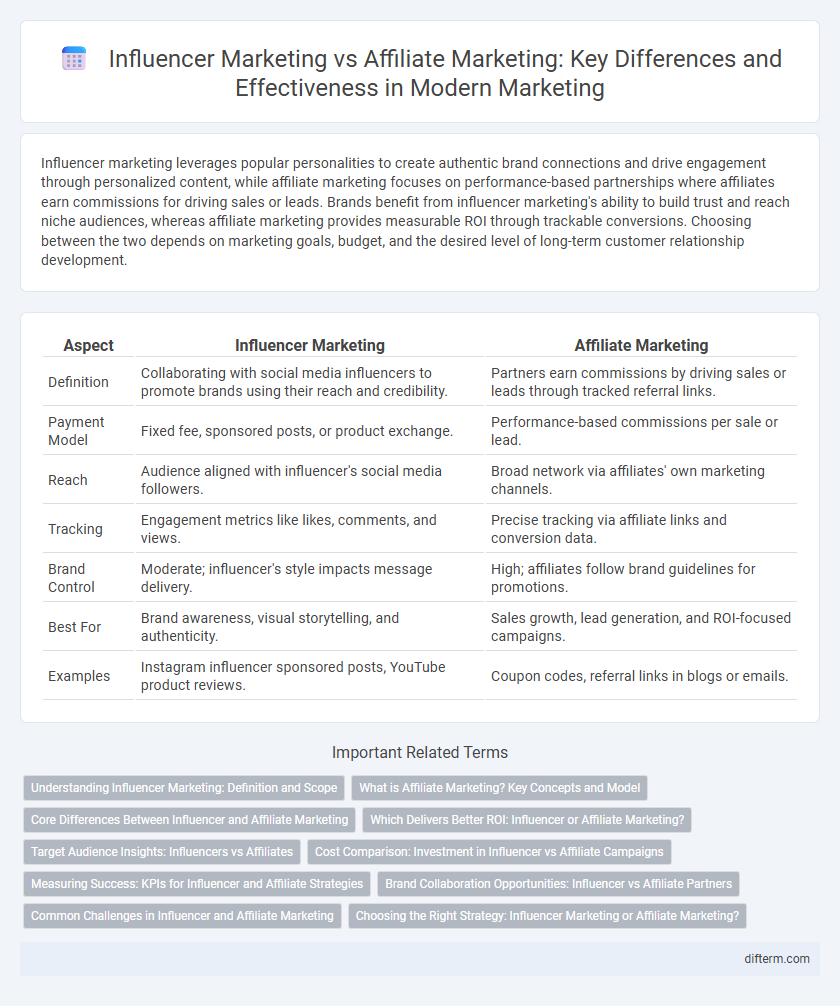Influencer marketing leverages popular personalities to create authentic brand connections and drive engagement through personalized content, while affiliate marketing focuses on performance-based partnerships where affiliates earn commissions for driving sales or leads. Brands benefit from influencer marketing's ability to build trust and reach niche audiences, whereas affiliate marketing provides measurable ROI through trackable conversions. Choosing between the two depends on marketing goals, budget, and the desired level of long-term customer relationship development.
Table of Comparison
| Aspect | Influencer Marketing | Affiliate Marketing |
|---|---|---|
| Definition | Collaborating with social media influencers to promote brands using their reach and credibility. | Partners earn commissions by driving sales or leads through tracked referral links. |
| Payment Model | Fixed fee, sponsored posts, or product exchange. | Performance-based commissions per sale or lead. |
| Reach | Audience aligned with influencer's social media followers. | Broad network via affiliates' own marketing channels. |
| Tracking | Engagement metrics like likes, comments, and views. | Precise tracking via affiliate links and conversion data. |
| Brand Control | Moderate; influencer's style impacts message delivery. | High; affiliates follow brand guidelines for promotions. |
| Best For | Brand awareness, visual storytelling, and authenticity. | Sales growth, lead generation, and ROI-focused campaigns. |
| Examples | Instagram influencer sponsored posts, YouTube product reviews. | Coupon codes, referral links in blogs or emails. |
Understanding Influencer Marketing: Definition and Scope
Influencer marketing leverages individuals with significant social media followings to promote products or services, tapping into their credibility and audience trust. This strategy encompasses various platforms like Instagram, YouTube, and TikTok, enabling brands to target niche markets with authentic content. Unlike affiliate marketing, influencer marketing focuses on brand awareness and engagement rather than solely driving sales through trackable links.
What is Affiliate Marketing? Key Concepts and Model
Affiliate marketing is a performance-based marketing model where businesses reward affiliates for driving traffic or sales through their promotional efforts. Key concepts include tracking links, commissions, and the partnership between merchants and affiliates to maximize ROI. This model leverages influencers or publishers to promote products, ensuring measurable outcomes tied to specific customer actions.
Core Differences Between Influencer and Affiliate Marketing
Influencer marketing leverages the personal brand and audience trust of content creators to promote products, often through sponsored posts and authentic storytelling. Affiliate marketing centers on performance-based partnerships where affiliates earn commissions by driving direct sales or leads through unique tracking links. The core difference lies in influencer marketing's emphasis on brand awareness and engagement, while affiliate marketing prioritizes measurable conversions and ROI.
Which Delivers Better ROI: Influencer or Affiliate Marketing?
Affiliate marketing typically delivers better ROI than influencer marketing due to its performance-based model where payments are tied directly to sales or leads. Influencer marketing's ROI can vary widely based on influencer credibility, audience engagement, and campaign goals, often focusing more on brand awareness than direct conversions. Brands aiming for measurable sales growth tend to favor affiliate marketing for its tangible return on investment and cost-effectiveness.
Target Audience Insights: Influencers vs Affiliates
Influencer marketing leverages content creators' authentic connections with niche audiences, providing deep insights into consumer preferences and behaviors through direct engagement and social feedback. Affiliate marketing focuses on driving measurable conversions by targeting performance-driven buyers who respond to incentives and exclusive offers, allowing precise tracking of audience purchasing patterns. Combining these approaches enhances marketing strategies by balancing brand trust with data-driven sales optimization based on detailed audience analytics.
Cost Comparison: Investment in Influencer vs Affiliate Campaigns
Influencer marketing campaigns typically involve higher upfront costs due to payments for brand exposure, content creation, and potential exclusivity agreements, often ranging from hundreds to thousands of dollars per post depending on the influencer's reach and engagement. Affiliate marketing operates on a performance-based model, where businesses pay commissions--usually between 5% and 30% of sales generated--minimizing initial expenditure and aligning costs directly with revenue results. Brands seeking cost-effective growth often prioritize affiliate marketing for scalable ROI, while influencer marketing suits campaigns needing rapid brand awareness despite larger initial investments.
Measuring Success: KPIs for Influencer and Affiliate Strategies
Key performance indicators (KPIs) for influencer marketing typically include engagement rate, reach, and brand sentiment, which reflect audience interaction and brand perception. Affiliate marketing KPIs center on conversion rates, click-through rates, and average order value, emphasizing direct sales and revenue generation. Combining these metrics provides a comprehensive view of campaign effectiveness across both influencer and affiliate strategies.
Brand Collaboration Opportunities: Influencer vs Affiliate Partners
Influencer marketing offers brands personalized collaboration opportunities through authentic content creation and audience engagement, driving higher emotional connection and brand loyalty. Affiliate marketing focuses on performance-based partnerships, where affiliates promote products in exchange for commissions, optimizing cost-efficiency and measurable ROI. Brands seeking long-term community building often prefer influencers, while those prioritizing direct sales and attribution lean towards affiliate partners.
Common Challenges in Influencer and Affiliate Marketing
Influencer marketing and affiliate marketing both face challenges in measuring authentic engagement and ROI due to varying attribution models. Ensuring compliance with advertising regulations and maintaining brand consistency across diverse creators complicate campaign management. Additionally, both strategies struggle with fraud detection, including fake followers and click fraud, which compromise campaign effectiveness.
Choosing the Right Strategy: Influencer Marketing or Affiliate Marketing?
Influencer marketing leverages trusted personalities to create authentic brand connections and drive engagement, ideal for building brand awareness and emotional appeal. Affiliate marketing focuses on performance-based sales through tracked links, offering measurable ROI and cost-efficiency for driving conversions. Selecting the right strategy depends on campaign goals, target audience behavior, and budget allocation to maximize marketing impact.
influencer marketing vs affiliate marketing Infographic

 difterm.com
difterm.com